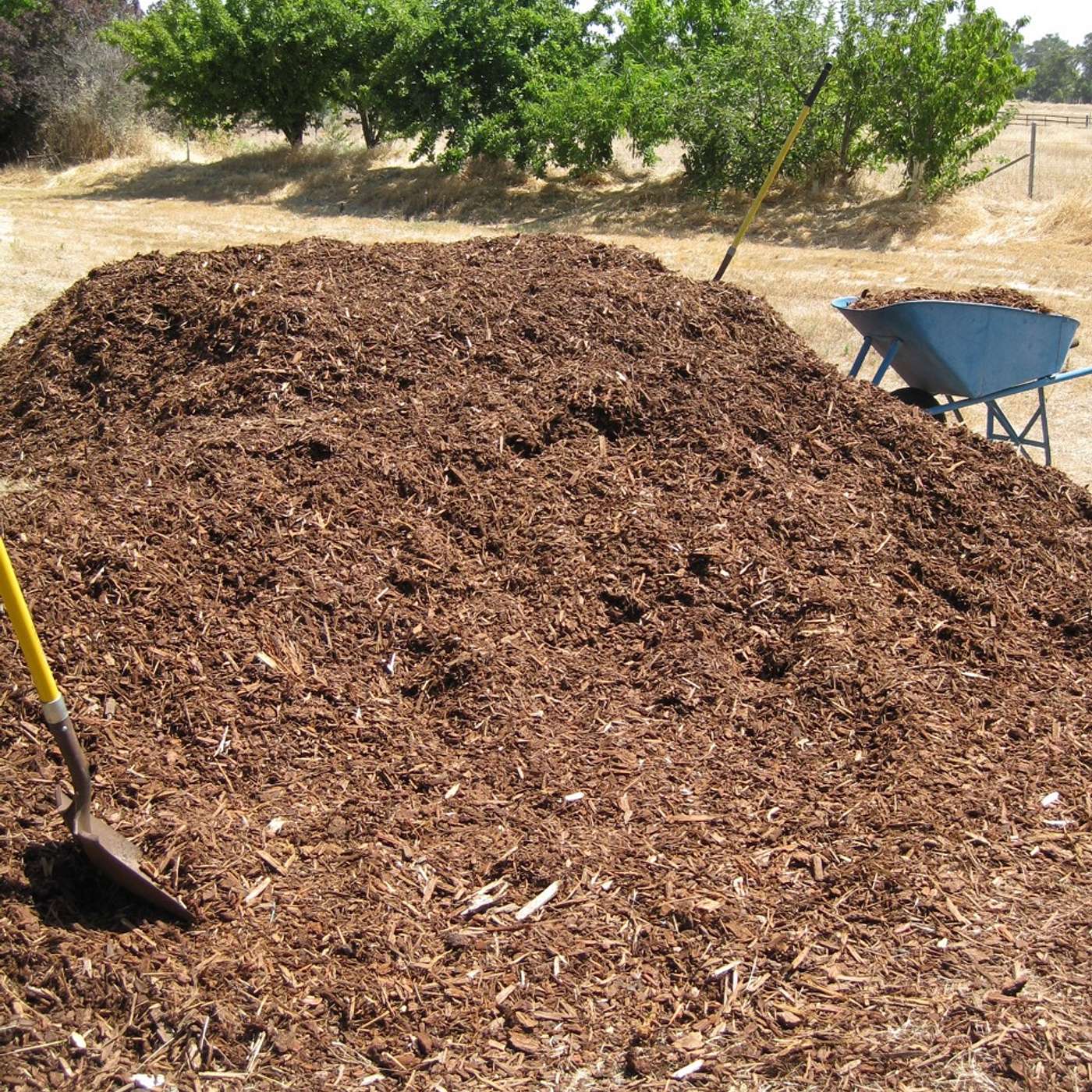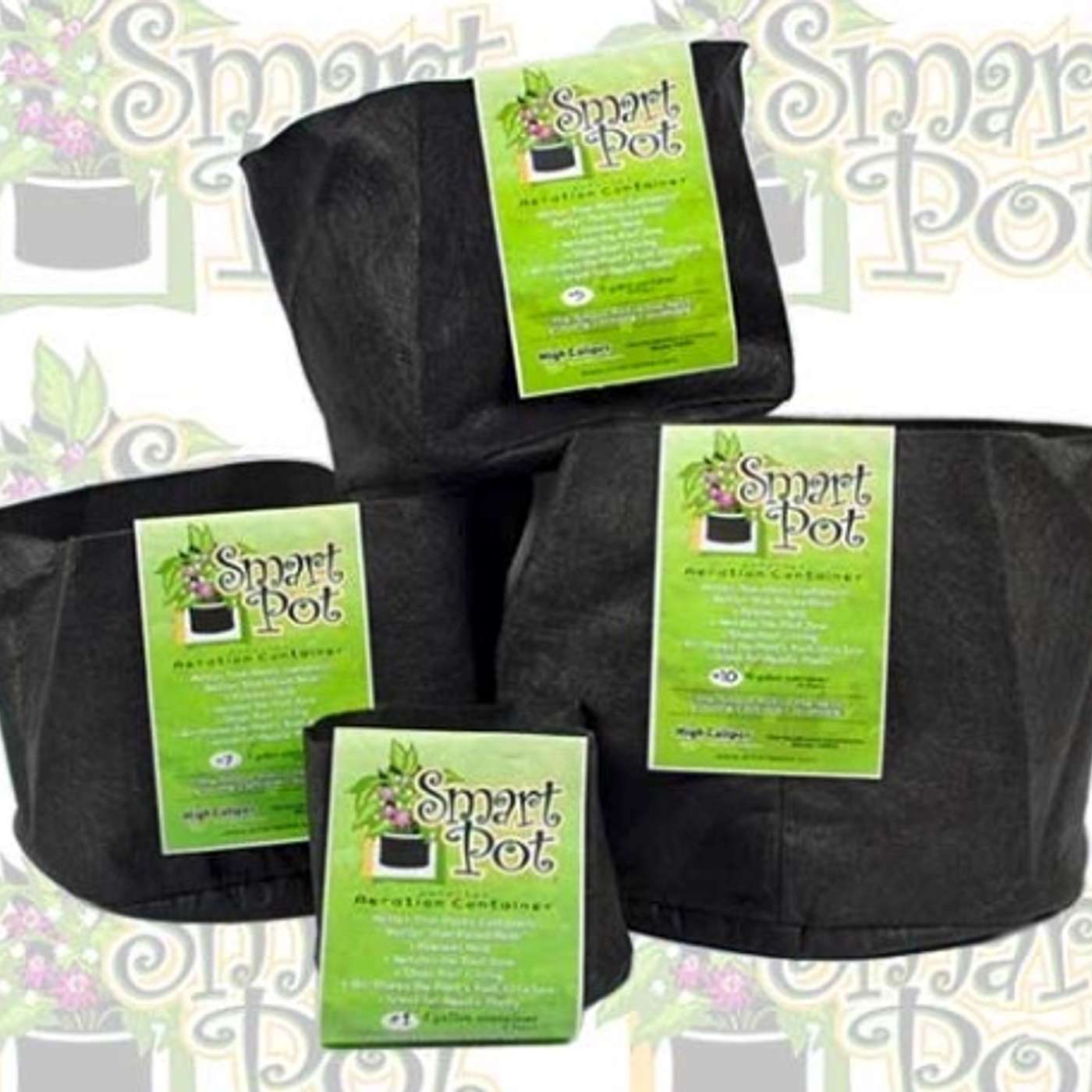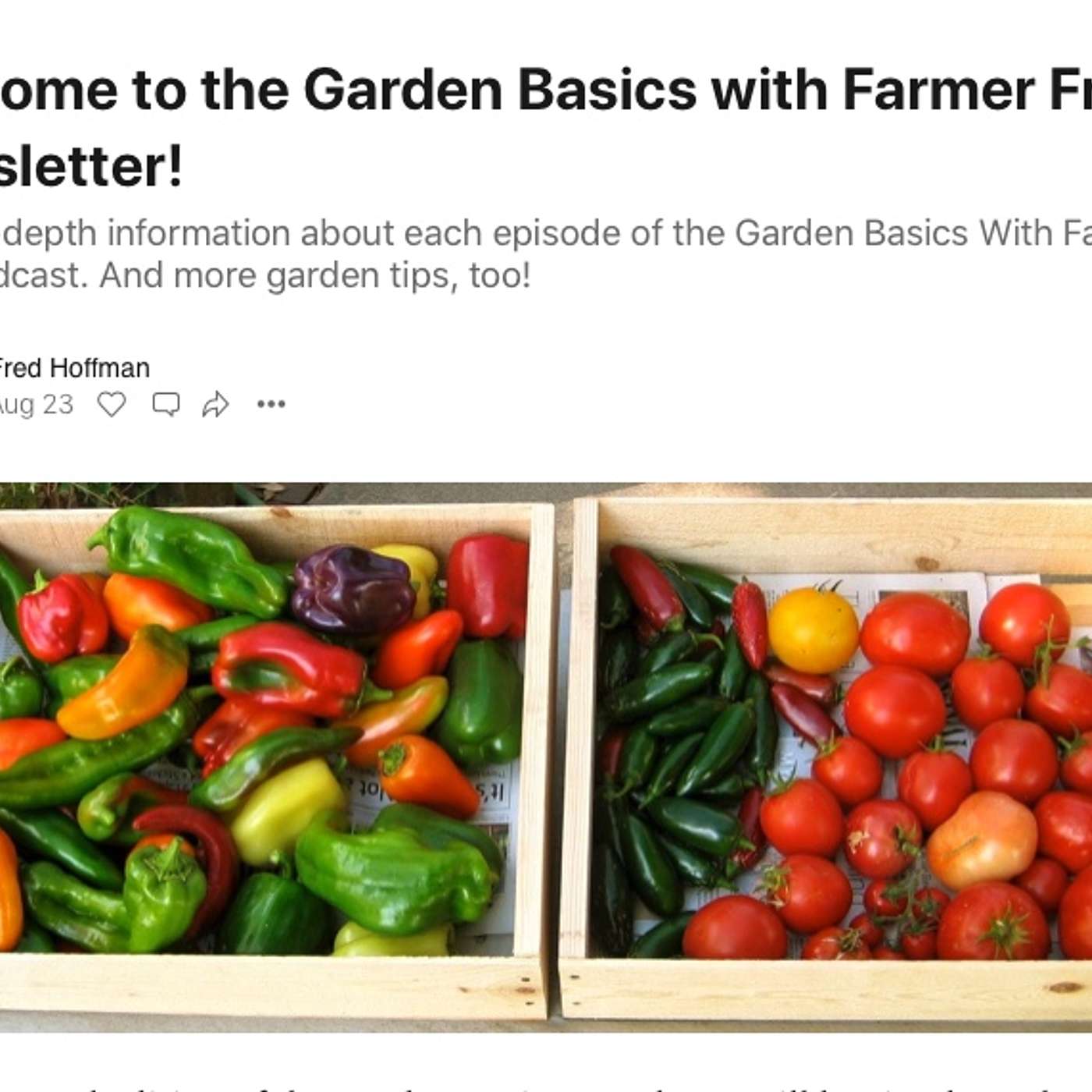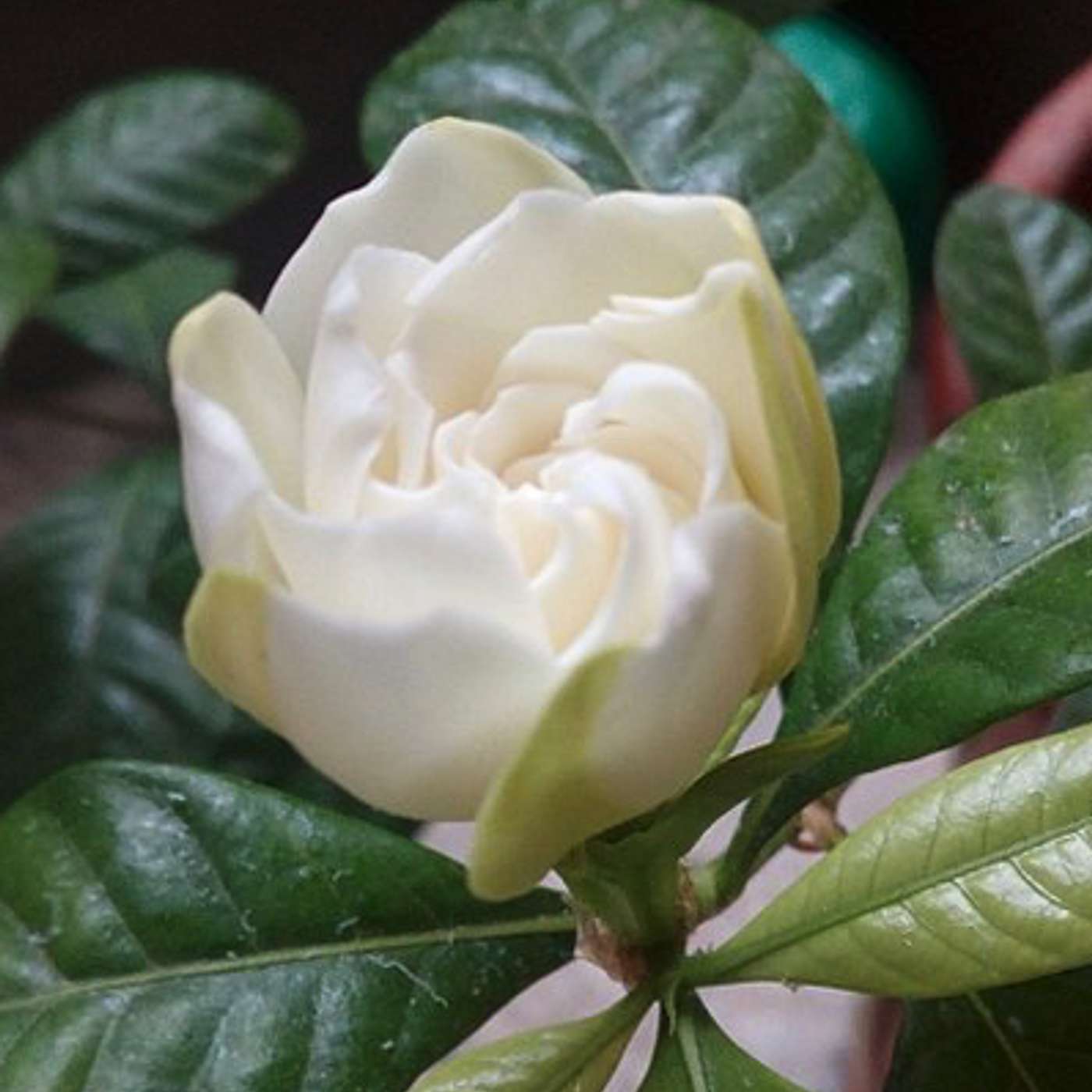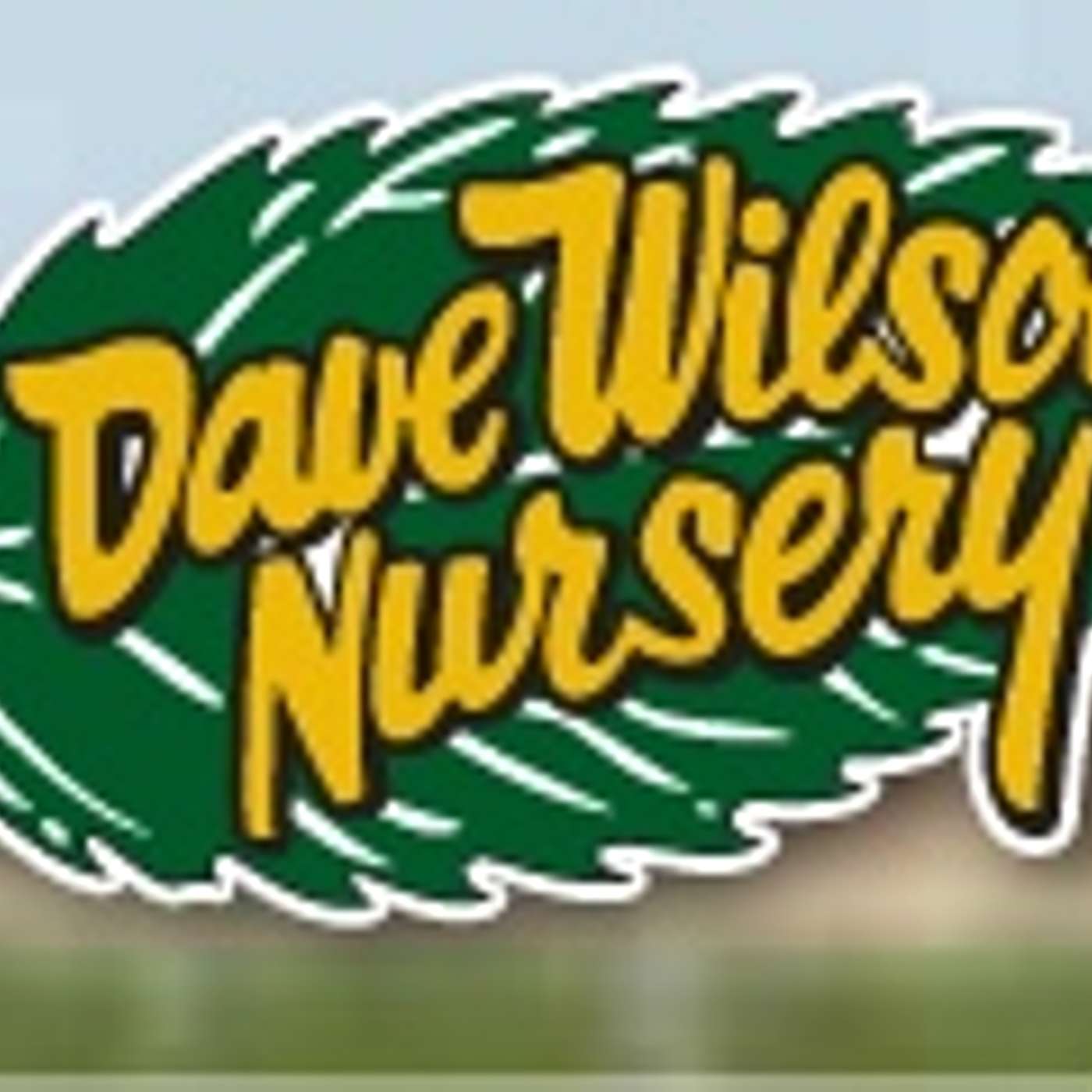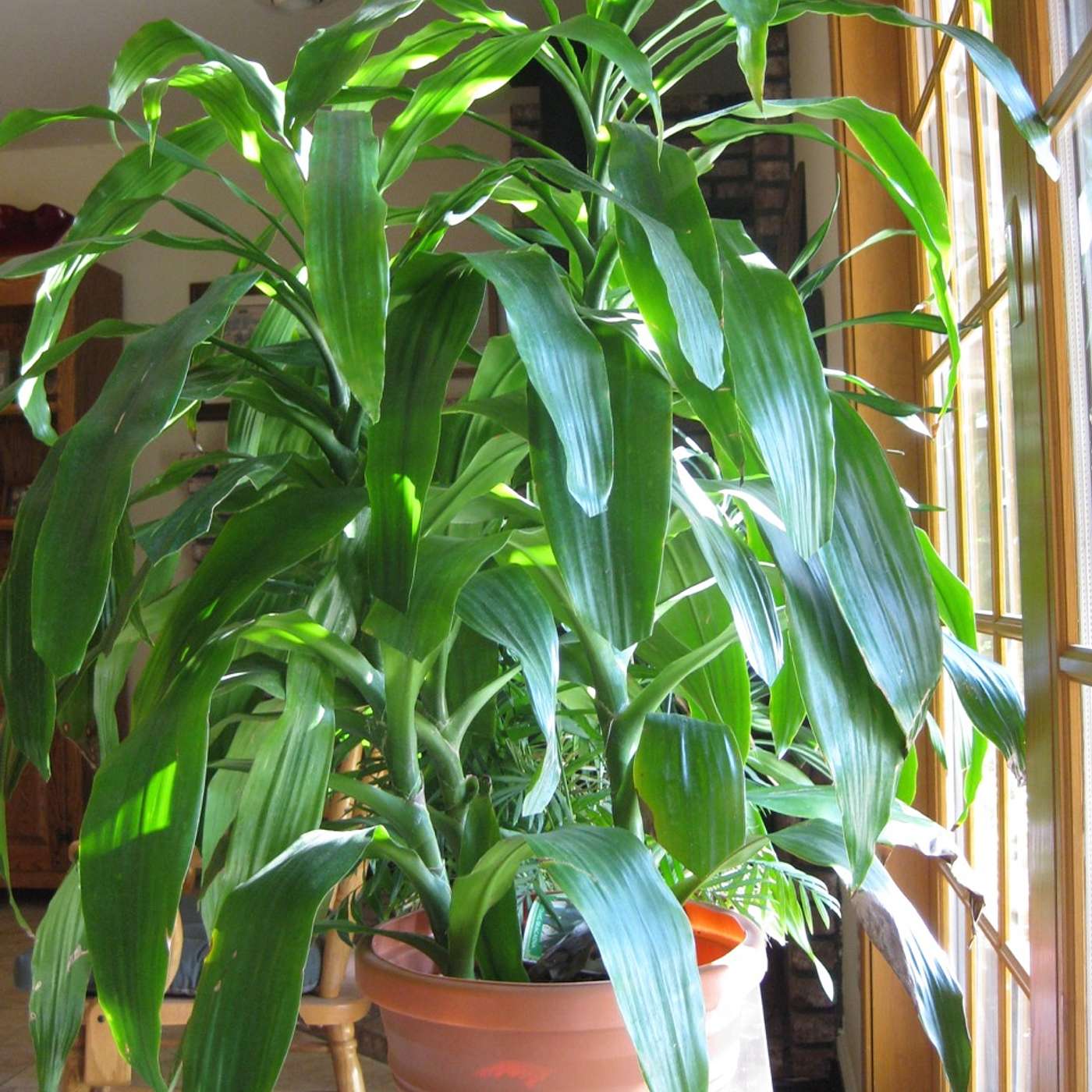Garden Basics with Farmer Fred
135 Easy Houseplants. Mulch Worries. The Gardenia.
We all know someone who complains that they have killed every houseplant they have ever owned. Today, we talk with a houseplant professional who has a list of five nearly impossible to kill houseplants!
We’ve talked about the benefits of using chipped and shredded tree limbs as mulch. Are there any tree varieties that you should avoid?
College horticulture professor Debbie Flower has the tips.
And, UC Davis Arboretum Superintendent Emeritus Warren Roberts has a sweet-smelling Plant of the Week - the gardenia.
It’s on episode 135 of the Garden Basics with Farmer Fred podcast, brought to you today by Smart Pots and Dave Wilson Nursery.
And we will do it all in under 30 minutes. Let’s go!
Pictured:
The Dracaena, “Janet Craig”
Links:
Smart Pots
Dave Wilson Nursery
UC Davis Arboretum
New! The Garden Basics with Farmer Fred Newsletter
Emerald City Interior Landscape Services
Book: Ortho's Complete Guide to Successful Houseplants
Landscapers Guide to Mulch
Gardenia Care
More episodes and info available at Garden Basics with Farmer Fred
Garden Basics comes out every Tuesday and Friday. More info including live links, product information, transcripts, and chapters available at the home site for Garden Basics with Farmer Fred. Please subscribe, and, if you are listening on Apple, please leave a comment or rating. That helps us decide which garden topics you would like to see addressed.
Got a garden question? There are several ways to get in touch:
leave an audio question without making a phone call via Speakpipe, at https://www.speakpipe.com/gardenbasics
Call or text us the question: 916-292-8964.
E-mail: fred@farmerfred.com
or, leave a question at the Facebook, Twitter or Instagram locations below.
Be sure to tell us where you are when you leave a question, because all gardening is local.
And thank you for listening.
All About Farmer Fred:
Farmer Fred website: http://farmerfred.com
Daily Garden tips and snark on Twitter
The Farmer Fred Rant! Blog
Facebook: "Get Growing with Farmer Fred"
Instagram: farmerfredhoffman
Farmer Fred Garden Videos on YouTube
Sign up for the new Garden Basics newsletter, on Substack (https://fredf82.substack.com). Free!
As an Amazon Associate, I earn from qualifying purchases from possible links mentioned here.
Thank you for listening, subscribing and commenting on the Garden Basics with Farmer Fred podcast and the Beyond the Garden Basics Newsletter.
We all know someone who complains that they have killed every houseplant they have ever owned. Today, we talk with a houseplant professional who has a list of five nearly impossible to kill houseplants!
We’ve talked about the benefits of using chipped and shredded tree limbs as mulch. Are there any tree varieties that you should avoid?
College horticulture professor Debbie Flower has the tips.
And, UC Davis Arboretum Superintendent Emeritus Warren Roberts has a sweet-smelling Plant of the Week - the gardenia.
It’s on episode 135 of the Garden Basics with Farmer Fred podcast, brought to you today by Smart Pots and Dave Wilson Nursery.
And we will do it all in under 30 minutes. Let’s go!
Pictured:
The Dracaena, “Janet Craig”
Links:
Smart Pots
Dave Wilson Nursery
UC Davis Arboretum
New! The Garden Basics with Farmer Fred Newsletter
Emerald City Interior Landscape Services
Book: Ortho's Complete Guide to Successful Houseplants
Landscapers Guide to Mulch
Gardenia Care
More episodes and info available at Garden Basics with Farmer Fred
Garden Basics comes out every Tuesday and Friday. More info including live links, product information, transcripts, and chapters available at the home site for Garden Basics with Farmer Fred. Please subscribe, and, if you are listening on Apple, please leave a comment or rating. That helps us decide which garden topics you would like to see addressed.
Got a garden question? There are several ways to get in touch:
leave an audio question without making a phone call via Speakpipe, at https://www.speakpipe.com/gardenbasics
Call or text us the question: 916-292-8964.
E-mail: fred@farmerfred.com
or, leave a question at the Facebook, Twitter or Instagram locations below.
Be sure to tell us where you are when you leave a question, because all gardening is local.
And thank you for listening.
All About Farmer Fred:
Farmer Fred website: http://farmerfred.com
Daily Garden tips and snark on Twitter
The Farmer Fred Rant! Blog
Facebook: "Get Growing with Farmer Fred"
Instagram: farmerfredhoffman
Farmer Fred Garden Videos on YouTube
Sign up for the new Garden Basics newsletter, on Substack (https://fredf82.substack.com). Free!
As an Amazon Associate, I earn from qualifying purchases from possible links mentioned here.
Thank you for listening, subscribing and commenting on the Garden Basics with Farmer Fred podcast and the Beyond the Garden Basics Newsletter.
GB 135 Easy Houseplants. Mulch Wariness. Plant of the Week: Gardenia
TRANSCRIPT
29:59
SPEAKERS
Debbie Flower, Caller Rex, Warren Roberts, Lori Ann Asmus, Farmer Fred
Farmer Fred 00:00
Garden Basics with Farmer Fred is brought to you by Smart Pots, the original lightweight, long lasting fabric plant container. it's made in the USA. Visit SmartPots.com slash Fred for more information and a special discount, that's SmartPots.com/Fred.
Farmer Fred 00:20
Welcome to the Garden Basics with Farmer Fred podcast. If you're just a beginning gardener or you want good gardening information, you've come to the right spot.
Farmer Fred 00:32
We all know someone who complains that they have killed every house plant they've ever owned. Today, we talk with a houseplant professional who has a list of five nearly impossible-to-kill houseplants. We've talked in the past about the benefits of using chipped and shredded tree limbs as mulch. But, are there any tree varieties that you should avoid? College horticulture Professor Debbie Flower has the tips. And UC Davis Arboretum Superintendent Emeritus Warren Roberts has a sweet-smelling Plant of the Week, the gardenia. It's all on Episode 135 of the Garden Basics with Farmer Fred podcast, brought to you today by Smart Pots and Dave Wilson Nursery. And we'll do it all in under 30 minutes. Let's go.
Rex Mulch 01:20
Hi, Fred. My name is Rex, and I have a question about one of your favorite things, mulch. I've read that certain types of mulch, like Eucalyptus, releases toxins and will harm any plants grown in it. I've read some more things about sunflowers that they're allelopathic and growing them near vegetables can harm the veggies. The internet is full of all sorts of baseless claims and gardening myths. So it's been hard to find any concrete, science-based information on these topics. I've wanted to use an arborist to get free mulch, but if they're going to drop off Eucalyptus, I'm not totally sure if it's a wise move or not. Is there any truth to these claims about toxicity? I hope you can help. And thanks so much for your show.
Farmer Fred 01:53
Rex, thank you for the question. And thank you for using Speakpipe.com, too. I just love the audio quality. You can send us that audio question without incurring any sort of data charges. Go to speakpipe.com slash gardenbasics. It's easy. Give it a try. And you just might end up on the podcast, just like Rex. Debbie Flower is here, our favorite retired college horticultural Professor. Debbie, there are a lot of myths surrounding, I wish I could say the word, allelopathic, the allelopathic nature of certain plants like walnuts and Eucalyptus.
Debbie Flower 02:29
Right. It happens that when I got my master's degree, I went to the University of California Davis. And they had finished a project about Eucalyptus. And they had a Eucalyptus forest when I first got there, and you could go and there would be nothing growing on the ground. And you could find the owl pellets. The owls like to be in the tall trees and they would eat the rodents and then I guess, they throw up bones and skin and hair or whatever. So it was all very interesting. Made great science projects with my kids at home. But then they decided they didn't need that forest anymore. And they took it down and mulched it and put on that Eucalyptus. It was pure Eucalyptus mulch all over campus. And nothing came up in it except Eucalyptus. And so this and other studies have been done by other people. This was not a controlled study at UC Davis. But I saw the results of that, that the eucalyptus, pure Eucalyptus, seems to have a pre emergent effect, meaning that it kills things as they germinate out of the ground, except for other Eucalyptus. And that actually, for me, would be a desirable effect in my ornamental garden for sure. If I were using it in my vegetable garden, I would then start on my plants and containers, anything planted into the eucalyptus mulched soil did just fine. It was just that the seeds underneath the eucalyptus mulch did not come up.
Farmer Fred 03:50
So you could use that Eucalyptus mulch right away after it was chipped and shredded around your existing plants?
Debbie Flower 03:56
Yes, absolutely.
Farmer Fred 03:58
Would leaving that chipped Eucalyptus in a pile for a certain length of time, a month or two months, help alleviate that situation?
Debbie Flower 04:05
Probably. I don't have data to say for sure. Allelopathy, if that's what it is, and sometimes it's not. But if it's a little patchy, it's due to chemicals that are in the parts of the plant and those chemicals will leach or wash out with water or become volatilized, which means they become a gas and are given off. And the decomposition will begin and the things that can live in Eucalyptus mulch will start to consume them. So over time, the effect of the chemicals in the eucalyptus will decline. Many things are declared allelopathic as the caller said that are not. They're just excellent competitors. They take up all the nutrition and the water that's available or they carpet the ground themselves with enough of a mulch that other things don't germinate. I do get, as he suggested, I do get chips from arborists and spread them around my landscape. And at first for sure I have no seeds coming up. And it's just because I've covered them and the seeds still there will germinate under the mulch. They germinate, but they don't have enough food to get up through the thick layer of mulch I put on the ground and grow. Over time, that stuff will break down, the eucalyptus included, and then the seeds can sprout right into the mulch itself. But I would have no hesitation about using Eucalyptus mulch in my landscape.
Farmer Fred 05:34
So Rex, go ahead and mulch away. Yeah. Are there any trees that you'd be cautious about? If an arborist offered you a load of certain trees that you'd be reluctant to put around existing plants?
Debbie Flower 05:45
To put around existing plants? No. Okay. I would not.
Farmer Fred 05:48
What about any sort of diseased trees that were taken out?
Debbie Flower 05:51
There's no evidence that does and there have been experiments done on this. There's no evidence that disease and insects survive the chipping process and the mulching process.
Farmer Fred 05:59
Even something like verticillium wilt?
Debbie Flower 06:01
Yes.
Farmer Fred 06:02
Wow. That's good news. Yeah. All right. And termites won't survive. No diseases. You know what will survive though? It's liquidambar, those seedballs.
Debbie Flower 06:13
Yes. I have a casuarina, a river she-oak that came up from my mulch, right in front of my house. So I dug it up and moved it, so you can get offspring. But I also have a lot of oaks on my property because the oaks on my property are producing acorns that are starting. So I don't see using the mulch as causing any more problems with existing plants that might in the seed department.
Farmer Fred 06:39
And so basically, then the drawback really, for seeds that don't germinate, is there's too much shade.
Debbie Flower 06:46
They try to germinate and grow. They come up, because temperatures are right and moisture is right. And they're looking for the sun, "looking", I know, is an anthropomorphic term, but they are seeds, they have food in them enough for the baby plant, which also exists in the seed to grow to reach the sun. And if they don't reach the sun, they just die. And that's how mulch works to prevent seeds from growing.
Farmer Fred 07:07
Well, since you brought that up. Here's a scenic bypass. Aren't sunflower heads always looking for the sun?
Farmer Fred 07:13
Yes, they turn and isn't there a name to that? phototropic? photochromic? Yeah.
Farmer Fred 07:18
So they're looking for the sun?
Debbie Flower 07:20
Yes, they, they respond to the sun. House plants respond to the sun, plants planted like your Abutilon here, close to the to the building, will reach out toward the sun. And that is because the...do You want to know why?
Farmer Fred 07:34
Sure.
Debbie Flower 07:36
I guess there's a hormone, auxin. And it's produced primarily in buds in the growing tips. And it moves down the stem and it controls, among other things, controls branching. But the auxin moves away from the sun, and it causes cell elongation. So when the auxin moves from the sunny side of a stem to the shady side of the stem, the cells on the shady side get longer, and that causes this stem to naturally curve toward the sun.
Farmer Fred 08:05
All I'm thinking about is auxin. That's a great word for Words with Friends, because it's spelled A-U-X-I-N.
Debbie Flower 08:11
Yes, I've been playing Scrabble on my phone. Yeah.
Farmer Fred 08:15
No, yes. Auxins. Yes. elongated cells. Yes. All right. What was the question? Oh, Rex. Yeah, yeah. I love mulch. Yes. Yes. Thank you, Rex, mulch away. Debbie Flower. Thanks again for getting into the nuts and bolts of things.
Debbie Flower 08:30
My pleasure.
Farmer Fred 08:35
We're glad to have Smart Pots on board supporting the Garden Basics podcast. Smart Pots are the original, award-winning fabric planter. They're sold worldwide. Smart Pots are proudly made 100% in the USA. I'm pretty picky about who I allow to advertise on this program. My criteria, though, is pretty simple. It has to be a product I like; a product I use; a product I would buy again. And Smart Pots clicks all those boxes. They're durable. They're reusable. Smart Pots are available at independent garden centers and select Ace and True Value stores nationwide. To find a store near you visit SmartPots.com slash Fred. It's Smart Pots, the original award winning fabric planter. go to SmartPots dot com slash Fred for more info and that special Farmer Fred discount on your next Smart Pot purchase, go to SmartPots.com slash Fred.
Farmer Fred 09:35
Because there are so many demands on your time these days, I like to keep the Garden Basics podcast to under 30 minutes. Still, there is a lot more to tackle on all the garden subjects we bring up on the podcast. So, for that, and a lot more, we’re starting up The Garden Basics with Farmer Fred newsletter, on Substack. As the newsletter grows, so will the subject matter. So, yes, it will be a good supplement for the Garden Basics podcast, but there will be a lot more garden related material and probably pictures of my dogs and cats, as well. It’s the Garden Basics with Farmer Fred Newsletter on Substack. And best of all, it’s free! There’s a link in today’s show notes. Or, just go to substack.com, and do a search for Garden Basics with Farmer Fred. That’s substack.com. The Garden Basics with Farmer Fred newsletter. Did I tell you it’s free? It’s free.
Farmer Fred 10:39
Every week we like to talk with Warren Roberts out at the UC Davis Arboretum and Public Garden. He is their Superintendent Emeritus, one of the wisest plant people I know. And every week we get a plant that's probably putting on a show where you live, if you happen to have it. And there is one widely available plant; most nurseries, even the big box stores, carry this shrub. It's the gardenia. And one of the nice things, Warren, about the gardenia, is it's an evergreen shrub.
Warren Roberts 11:07
It's an evergreen shrub and it has a long flowering period. When the weather warms up, the flowers start blooming, and continue blooming into frost. Native to Southeast Asia mainly. It has a wide range there. I'll just quickly name the places: Korea, Japan, South China, Taiwan, Vietnam, Myanmar, which used to be called Burma, Bangladesh, which used to be called East Pakistan, and India. It is from a summer rain area. So in areas that have dry summers, it will need some water. It loves heat. In California, we enjoy that. Because in the parts of the interior of California where I live, it gets hot, and the gardenias love it. They do best in really hot areas if they have shade in the afternoon. An east wall is a really good place to grow it in the interior of California, but it produces beautifully fragrant flowers. There was some discussion as to what it was in the early years of its discovery by European culture. Was it a jasmine or what was it? The name Jasminoides means it's Jasmine-like. In fact, flowers are sometimes used to flavor tea along with some some teas flavored by jasmine others flavored by osmanthus blooms. So it has had a long period, a long history of cultivation, particularly in China. And there are different forms of it. Some are quite double. Some are hardier to cold. Some are dwarf, some bloom almost all year. The fragrance is so delightful to me. It's one of my favorite fragrances. And I knew that I had lost some of my sense of smell when I was smelling a gardenia and it didn't smell quite right. But I can still smell it. It just takes a little stronger sniffing. And, why is it called gardenia? Well, the botanist that named it, the name refers to a Scotsman, Alexander Garden, who lived many years in Charleston, South Carolina, where he was a businessman, but he also loved plants and even sent samples of plants to Linnaeus, the taxonomist in Europe. He had to leave South Carolina because he was a united Empire loyalist, which means he was loyal to the king. And when the king lost the colonies, he had to leave his trial properties were confiscated and he moved actually to England. This beautiful flower is named for this fellow. There are many other species of gardenia that genus is about 200 species, including South Africa. Now for many years, it was thought that it was originally from South Africa. That's why it has the common name of Cape Jasmine, cape referring to the Cape of Good Hope. But the gardenia that is native there is not the same thing. The genus is native to tropical and warm Old World areas that is to say not the Americas, especially Asia. And then, of course, as I mentioned, South Africa.
Farmer Fred 14:22
Yeah, we should point out to that there are many named varietals of the gardenia that the jasminoides is probably the most popular species, but they range in sizes from six to 12 inches up to eight feet or taller. So be sure you know what you're getting. For instance, the radicans only grow six to 12 inches tall. And then there are others and probably the most popular is 'Mystery', which can get six to eight feet tall.
Warren Roberts 14:51
And most of them don't produce fruit, but they produce lots of flowers. They're actually, you know, I'm backtracking a little bit here. I think there are actually some species native to the Hawaiian Islands. But the one that we're growing in the garden that we grow in our gardens is this species, gardenia, jasminoides, and the common name we use in California is just plain gardenia.
Farmer Fred 15:15
I'm looking here at the Sunset National Garden book and they make a wry comment about gardenias' demands. It says, "like a temperamental artist, the gardenia has its own set of rules. Fuss over them, and the plant gives beauty. Ignore them, and they yellow and die. For thriving gardenias, provide warmth, regular water and feeding and good soil drainage.
Warren Roberts 15:38
That sounds right. And if you have our alkaline soil, you can acidify it with garden sulfur, which is inexpensive and very effective.
Farmer Fred 15:48
Exactly. And for those of you on the East Coast or down south, you may already have acidic soil. So that's not much of an issue.
Warren Roberts 15:54
That's true.
Farmer Fred 15:55
The gardenia it's an excellent plant, widely available and it is definitely a show for the nose. Warren Roberts, again is the superintendent emeritus of the UC Davis Arboretum. You ought to visit the Arboretum sometime when you're in Northern California. Drop by Davis, California and tour the campus of UC Davis because it is basically a really large, over 5000 acres, of public garden. The Arboretum itself, Warren, is what, about 100 acres or so in the Arboretum proper? But again, there are plantings throughout the whole campus.
Warren Roberts 16:29
That's right. The University of California Davis Arboretum and public garden basically includes the whole campus, although there is an area, about 100 acres, dedicated to the Arboretum itself.
Farmer Fred 16:44
And it's gorgeous year round. So pay it a visit. More information available at their website: Arboretum.ucdavis.edu . Warren, thanks for the show for the nose, the gardenia.
Warren Roberts 16:45
You're welcome.
Farmer Fred 16:48
You have a small yard and you think you don't have the room for fruit trees. Well, maybe you better think again. Because Dave Wilson Nursery wants to show you how to grow great tasting fruits, peaches, apples, pluots and a lot more in small areas. You could even grow them in containers on patios, as well. It's called backyard orchard culture. And you can get step by step information via the Fruit Tube videos at DaveWilson.com. And that's where you're going to find the closest nursery to you that carries Dave Wilson's quality fruit trees. So start the backyard orchard of your dreams at DaveWilson.com.
Farmer Fred 17:41
If you're new to the world of houseplants, or maybe you're wondering what are some easy care house plants that don't cause too much trouble and they're fairly easy to take care of, we have the perfect guest for you to listen to today on Garden Basics. Interior landscaper and Master Gardener, Loriann Asmus, who owns the Sacramento-based company, Emerald City Interior Landscape services. Easy care houseplants. You hear this question every day? I imagine you can answer that quickly.
Lori Ann Asmus 18:09
Yes, I can. But I want to just segue into what makes a houseplant easy, in my opinion. First of all, it's got to be resistant to insects and disease. And second of all, it has to be very forgiving not only of light conditions, but also of watering anomalies.
Lori Ann Asmus 18:26
Easy Care houseplants. Give us the list. All right, number one, Chinese evergreen Chinese evergreen, Aglaonema.
Lori Ann Asmus 18:37
Oh, well, now there's many different types. Okay, and I wouldn't even I wouldn't even go there. I would just say Aglaonema. That's the genus, aglaonema. A-G-L-A-O-N-E-M-A. aglaonema. Chinese evergreen, if you look it up, they're not a tall house plant. Okay. They're kind of a fluffy, three foot house plant or as a desk plant in a six inch pot. They have many, many, many different varigations: dark green, silvery, some have white stems, some have pink in them. They're just really neat and they don't take a lot of light. Okay, they do want some light, they would do well in an East window, but they can tolerate a North window. We haven't really talked about light yet, but we will.
Farmer Fred 19:23
No we won't.
Lori Ann Asmus 19:24
Eventually.
Farmer Fred 19:24
Eventually.
Lori Ann Asmus 19:25
You'll have to keep an eye on us. Because we might talk about it while you're asleep. Anyway, Chinese evergreen is one of my favorites. It serves a lot of design purposes. It can get mealybugs, but it's pretty easy to control and it's not real frequent. They seem to be susceptible to fluoride problems, but they will go several years without showing damage.
Farmer Fred 19:47
Alright, Chinese evergreen. Aglaonema, number one. Okay, number two.
Lori Ann Asmus 19:50
Okay. Dracaena. Of course we got to do the Dracaenas, right. Dracaenas used to be one of my really favorite, favorites. Now I'm kind of a little bit skeptical, because, and I don't know if it has to do with mother stock, or just the way they're being grown or what it is, but they just don't seem quite as robust as they used to. I love the Dracaena deramensis, 'fragrance', the 'fragrance' variety is really, when it's an old style that you really can't find that much. Dracaena fragrans 'massagiana' is a really good one. There's one they call it maskeen, that's the one with the golden stripe. And that's probably one of your easiest care, the Lisa and the Hawaii girl and here in Sacramento, especially they can get spider mites, and sometimes they're very, very susceptible to fluoride.
Farmer Fred 20:34
Alright, and so for spider mite problems, I guess dry climates would be most susceptible. Yes,
Lori Ann Asmus 20:38
Yes, like people in San Francisco who say, I've never had spider mites on that plant. It's like,, No, you haven't because you live in San Francisco. Here in Sacramento, anything that could get spider mites is gonna get them, right.
Farmer Fred 20:51
we've got two there that by the way, Dracaena isn't spelled the way it sounds. D R A, C, A E N A. Yeah, there's that "a" in there that doesn't belong there.
Lori Ann Asmus 21:00
Yeah, okay, whatever.
Farmer Fred 21:02
Alright, Dracaena. Chinese evergreen, we have Dracaena, number three.
Lori Ann Asmus 21:07
Sansevieria is the snake plant or mother in law's tongue. And what's really cool about that is, it used to be you got this one Sansevieria, right. And it was kind of tall xylanica. Or there was another one I can't remember right off the top, my head went the other one was. The xylanica. It was very popular. And it was kind of tall and narrow. And whatever it was, it was just one kind of one shape, is all you really got. Now, there's all different kinds that are popular. And there's some with narrower leaves and some with different various sort of like what I was stressing about the Chinese evergreen where they're like really lots of different kinds of Sansevierias. They are pretty much bulletproof. They can get scale, they can get mealybugs, but it's a very, very, very rare. And you can almost grow them in a closet, like you know, three weeks in the dark and they just don't seem to have too much trouble with that. And they don't require a lot of water and they're just really easy care and interesting plants. Some people don't care for them because they are kind of pointy. And so from a Fung Shui perspective, they're not really great, but I like them a lot. Sansevieria. snake plant.
Farmer Fred 22:16
That's number three. We have Chinese evergreen. Dracaena and Sansevieria. Okay, number four.
Lori Ann Asmus 22:22
can I say the whole name?
Farmer Fred 22:24
I hope so
Lori Ann Asmus 22:25
Zamioculcas zamiifolia. You know what it is, right?
Farmer Fred 22:30
Yes. Both those words begin with the letter Z. Yes. So, it's ZZ Top!
Lori Ann Asmus 22:35
zz plants. ZZ plant. or Fat Boy.
Farmer Fred 22:39
Oh, really?
Lori Ann Asmus 22:40
They call it fat boy, because it has that enlarged stem. Now the thing that's cool about the zz plant is that it's actually a succulent.
Farmer Fred 22:47
I did not know that.
Lori Ann Asmus 22:48
Yes, it's true. It's a succulent. I know we're going to talk about propagation sometime. But I'll tell you what's really neat is you can actually even take a leaf off the stem and it will propagate much like African violet does, because of the undifferentiated tissue.
Farmer Fred 23:02
Use half a leaf or the whole leaf?
Lori Ann Asmus 23:04
Right. Either one. Yeah, it's kind of neat. It's a succulent, it doesn't need a lot of water, it will do better with a little bit more light than the Sansevieria requires. And you know, I should say when they say low light tolerant, they really are talking about low light tolerant, not low light loving. So yes, tolerant. Yes. So most plants, they will tolerate the lower light conditions, but they would prefer to have a little bit more and the more light that you can give them up to a point, yes, up to a point, it's going to be better. So the ZZ plant can tolerate very low light conditions and doesn't need a lot of water. Every two or three weeks is fine. Or probably for you, once a month.
Farmer Fred 23:44
Once a month. Yes. All right. Let's have a fifth house plant that's easy care. What would that be?
Lori Ann Asmus 23:49
Pothos.
Farmer Fred 23:50
P-O-T-H-O-S.
Lori Ann Asmus 23:52
And it's it's actually not like its real name. It's either satin pothos, which is my absolute favorite favorite favorite one.
Farmer Fred 23:59
Isn't that your stage name, Satin Pothos?
Lori Ann Asmus 24:02
Satiny. Anyway, Satin Pothos. That's right. Performing now. No. Anyway. It's my favorite, Scindapsis pictus. Scindapsus pictus. And that's SCINDAPSIS. scindapsis pictus.
Farmer Fred 24:23
Okay, so that's the botanical name for photos
Lori Ann Asmus 24:25
For satin pothos. Now the other poths, the Marble Queen and the Golden and the Jade, and some other ones that they have now, are mostly epipremnum. Although I have a feeling there's another name. They change those names often but I know it is epipremnum.
Farmer Fred 24:43
Can't we just call them pothos?
Lori Ann Asmus 24:44
Epipremnum orius would be golden pothos. Yes. Okay. So, they're trailing plants. Everything else that I talked about is an upright plant. So this is a trailing plant, something that you can use up somewhere high, and they do very, very well. Now sometimes pothos can get thrips. Okay, sometimes they can get other diseases as well. But mostly they are disease and insect free. They do require a little bit more regular watering. And you need to keep them pruned back a little bit if you want to keep them nice and full. The thing of growing them around your room like we did in college, and you tack it on whatever wall. Well, you wonder why it gets really bare back towards the pot?
Farmer Fred 25:26
Because there's no beer can pyramid there.
Lori Ann Asmus 25:29
Oh, I forgot about that. That's right. There's no pyramid there. That's right. The pyramid. Yeah, no, that's not why. it's because they only have so much energy for that long stringer. You know what I mean? And so all of the new growth is looking great, but the stuff back by the pot is dying off because there's just not enough energy to grow it all. So if you keep these things pruned back to say, the bottom of the pot, that would be a rule of thumb, maybe a little bit more than the bottom of the pot. Say, no more than six inches more than the bottom of the pot. You'll keep it nice and full.
Farmer Fred 26:01
Five easy care house plants. If you know somebody who says, "Oh, I can't grow house plants, try those five. Again, they are
Lori Ann Asmus 26:09
Chinese evergreen, Dracaena, ZZ Plant, Sansevieria, and Pothos.
Farmer Fred 26:15
There you go. Five easy care houseplants. Lori Ann Asmus, Master Gardener, Emerald City interior landscape services owner, house plant Queen, and plant princess. I forgot plant Princess. Lori ann Asmus, thanks for all that great information.
Lori Ann Asmus 26:31
You're very welcome. It's been a pleasure.
Farmer Fred 26:36
The Garden Basics with Farmer Fred podcast has a lot of information posted at each episode: transcripts, links to any products or books mentioned during the show. Plus, you can listen to just the portions of the show that interest you, it’s been divided into easily accessible chapters. There’s other helpful links for even more information, including the new Garden Basics newsletter. And just like the podcast, it’s free. Plus you’ll find more information about how to get in touch with us. Leave an audio question without making a phone call via Speakpipe, at speak pipe dot com slash gardenbasics. it’s easy, give it a try. And you just might hear your voice on the Garden Basics podcast! You can also use your phone to call or Text us the question and pictures, 916-292-8964.916-292-8964. E-mail: fred@farmerfred.com . If you tell us where you’re from, that will help us greatly to accurately answer your garden questions. Because all gardening is local. In the show notes you’ll find links to all our social media outlets, including facebook, instagram, twitter, and youtube. Also, there’s a link to the farmerfred.com website. And if you would please, if you hear something you like, share it with your friends and family. Thank you!
Farmer Fred 28:01
Garden Basics comes out every Tuesday and Friday. It's brought to you by Smart Pots. Garden Basics is available wherever podcasts are handed out. And that includes Apple, Iheart, Stitcher, Spotify, Overcast, Google, Podcast Addict, Cast Box, and Pocket Casts. Thank you for listening, subscribing and leaving comments. We appreciate it.
Farmer Fred 28:25
We've learned a lot today from Loriann Asmus, Master Gardener, house plant expert, plant Princess, and the owner of interior at
Lori Ann Asmus 28:33
Emerald City
Farmer Fred 28:33
thank you. and the owner of and the owner... quiet you kids! be quiet! get off my lawn! And the owner of Emerald City interior landscape services. We've been talking from the Fair Oaks Horticulture Center here. I bet you have a website.
Lori Ann Asmus 28:50
I do. WWW...
Farmer Fred 28:54
don't say www, grandma.
Lori Ann Asmus 28:57
Emerald City plants.com.
Farmer Fred 28:59
Okay, Facebook, Instagram, Pinterest, Twitter, Tumblr. Grindr. What?
Lori Ann Asmus 29:05
Sounds nasty.
Farmer Fred 29:10
Um, you should be on Tick Tock.
Lori Ann Asmus 29:14
There's a link...
Farmer Fred 29:16
There's a link on my website. I've never seen it. But they tell me it's there. Or whatever.
Lori Ann Asmus 29:26
It takes me to Insta whatever....
Farmer Fred 29:30
Or Instaface or facegram. I forget. s
Lori Ann Asmus 29:34
Something like that. All right.
Farmer Fred 29:39
Thank you. I just realized something while we've been sitting here at the Fair Oaks horticulture center. Yes. We're sitting with ants.
Lori Ann Asmus 29:47
Oh, yeah. I noticed them on your leg.
Farmer Fred 29:50
Yeah. I guess it's time to move. Okay. Thank you.
Lori Ann Asmus 29:54
You bet. You bet. You're welcome.
